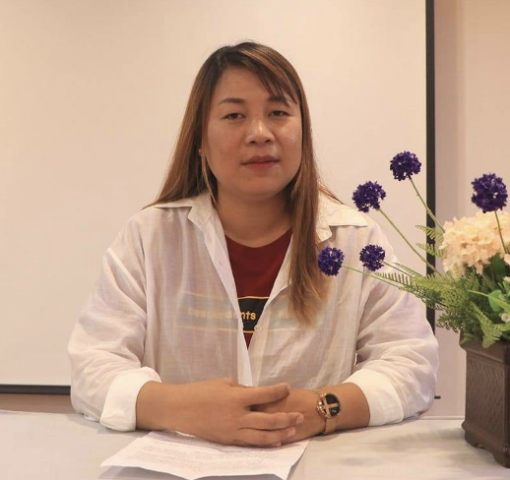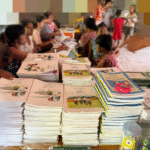An interview with Maw Phray Myar, a representative of Karenni CSOs, on the position statement from the CSOs about the evolving military and political situation in Karenni State
An interview with Maw Phray Myar, a representative of Karenni CSOs, about the position statement of the CSOs on the evolving military and political situation in Karenni State.
The statement called on the Karenni State Interim Executive Council (IEC) and armed groups to prioritize the human rights of the local population, protect women and children from various forms of violence, engage with relevant groups to strengthen local governance mechanisms, among other points. It also included calls to international organizations.
To understand the reasons behind the CSOs’ statement, the current situation faced by the people in Karenni State, and the priorities that the CSOs want the administration to focus on, Network Media Group (NMG) conducted this interview with Maw Phray Myar, a representative of Karenni CSOs. (Maw Phray Myar is also the General Secretary 2 of the Karenni National Women’s Organization-KNWO).
Q: Could you first explain the main reasons why the Karenni CSOs have come together to issue this statement?
A: We, the Karenni CSOs, have not held regular meetings to discuss sectoral issues since the 2021 military coup. We have been working in different places, providing services to the people while performing political tasks. It has been a long time since we as Karenni CSOs haven’t been able to come together. This year, we were finally able to meet again, mainly to discuss humanitarian issues, to coordinate our efforts across the state without overlapping and to ensure faster coordination.
Another important reason for us CSOs was to issue a statement on the political and military situation in Karenni State. We also want to advocate for localized coordination of humanitarian assistance at both international and national levels in response to the evolving political situation in our state.
Q: How many CSOs participated? And in what areas are these organizations active?
A: About 20 CSOs participated. The top 20 organizations are long-established ones. After the coup, some newer groups have also emerged to provide humanitarian aid. It is therefore a diverse mix of groups. There are women’s organizations, youth organizations, humanitarian groups as well as sector-specific CSOs working in areas such as education, health, social affairs and the economy. Some of the 20 organizations had security concerns, so their participation was not explicitly mentioned in our statement.
Q: As CSOs, what is your view on the IEC’s strengths and areas for improvement in the current performance?
A: As mentioned in our statement, we recognize the IEC as a revolutionary government. On the one hand, Karenni is a state with strong armed resistance. But the intensification of armed conflict has of course also affected various civil sectors such as education, health, social welfare and economy for our people.
The IEC may be doing a solid job in the education, health, social and political sectors, but its actual engagement and service delivery to the population remains rather limited. This is because its priority during this period has understandably been to build up its administration. As an independent civil society, we plan to fill the technical and human resource gaps of the IEC and coordinate more to contribute to the IEC.
And it has been over three years since the Karenni State Consultative Council (KSCC) was established. But the IEC seems to be only a few months old. To effectively represent the people and give them a voice, we CSOs need to continue to advise and encourage the IEC to strengthen the areas where its performance is still weak.
Q: CSOs are considered to be closer to the people than the IEC. What is the situation on the ground? Are the people in Karenni State largely aware of the IEC and do they accept them?
A: The 20 CSOs that came together for our consultation are widely spread in all areas of Karenni State. Since the KSCC and the IEC had a collective leadership model, there are also women and youth groups. The IEC implements the plans developed by the KSCC and we CSOs are also represented in the KSCC. On the other hand, most of the IEC human resources come from CSOs.
In the villages, communities and IDP camps where we CSOs work, we communicate the achievements, objectives and goals of the IEC. The IEC itself also conducts some public engagement at the sectoral level. So a decent number of people know of the existence of the IEC. However, mere awareness is not enough. For the IEC’s strategic plans and sectoral services to the people to really materialize, the IEC needs to intensify its efforts and engage more directly with the people than before. Only in this way can the IEC better understand people’s feedback and difficulties.
Q: In your opinion, what areas need to be urgently prioritized in the current situation in Karenni State?
A: After “Operation 1111”, the entire state has essentially become an IDP area for us. At the moment, food and shelter are top priorities. This is because many communities have not been able to farm for over three years. So we are still dependent on donor aid. However, donors are starting to tire and international attention is waning, which presents us with major challenges. The most urgent needs are food and shelter. Basic health care and education are the next priorities.
Q: Is there anything else you would like to add?
A: This statement by the Karenni CSOs highlights the political and military situation in our state and the need for greater unity and support that our state needs, with CSOs working in the administrative areas. It is clear from the statement that we urgently need international assistance and support from our ethnic brothers and sisters abroad. For this message to get through, the role of the media is also crucial. It would be great if the media could implify these issues. We hope that the IEC, the people as well as relevant groups in other states and regions and abroad will pay more attention to the points we have raised.
Sent by NMG.


